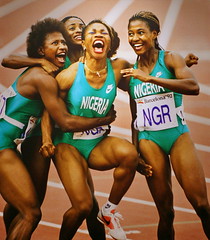|
|
| DURBAN, SOUTH AFRICA - JUNE 03: Zola Budd and Bruce Fordyce finish together during the 2012 Comrades Marathon on June 03, 2012 in South Africa. The 2012 Comrades Marathon is starting at the City Hall in Pietermaritzburg and finishing at the Sahara Kingsmead Cricket Stadium in Durban. (Image credit: Getty Images via @daylife) |
Taking advantage of
Dual Citizenship is important for African nations wanting to have a competitive
advantage in athletic games. Being competitive at the Olympics in a globalized world is just as much
about having an effective athletic management strategy as it is about the athletic ability of the Olympians. For African countries, getting
medals is not just a matter of poor training facilities, or lack of financial
resources.Its a matter of leveraging all available or potential human resources. Part of an effective global strategy is is inclusive of all of the nations people and thus increases the chance of a country to bring home medals.
Therefore, citizenship matters. In the past few years alone, there has been an increase in African athletes competing for non-African teams. There has also been an increase in non-African nations coveting successful African athletes. There are numerous examples of
African players that have changed their citizenship in order to compete at the
Olympics i.e. South African born runner Zola Budd competed for England; Kenyan born runner Bernard
Lagat competed for the USA; Kenyan born cyclist Chris Froome competed for Great Britain. Many countries in Africa have realized that lack of Dual Citizenship is costing them players and decreasing their competitiveness. Many countries have now taken the important step towards leveraging their athletes. Both Kenya and South Africa now offer Dual Citizenship to their nationals. It
is in the best interest of these countries in Africa to offer Dual
Citizenship so that they can increase their competitiveness at international
events through policies that encourage the retention of athletes.
|
|
| LONDON, ENGLAND - JULY 31: Tony Skinn #4 of Nigeria shoots in the Men's Basketball Preliminary Round match between Lithuania and Nigeria in London, England. (Image credit: Getty Images via @daylife) |
Many countries strategically
provide citizenship to African athletes as an incentive for these athletes to immigrate to their
country and compete for them in the Olympics. They offer the athletes additional
attractions like training facilities or an opportunity to qualify for the Olympics
in cases where they would not have qualified in their own countries. In the USA alone, fifty athletes migrated to the
USA between 1992 and 2008 to compete for their Olympic team that previously competed
for another country. At the London 2012 games, over 40 foreign-born citizens ran for the United States. This 'body gain' increases the chance for the USA to earn medals, money, national pride and prestige that comes with winning Olympic events. For the African countries that have lost a potential Olympic medal athlete, this is a tremendous loss. Many African athletes
also strategically maintain the citizenship of their country-of-origin or acquire citizenship of new nations so that they
can compete in the Olympics. Nigeria was able to send its first qualifying Basketball
team to the Olympics 2012 due to the contributions of Nigerian Dual Citizens in
the USA. Both Nigeria and USA recognize Dual Citizenship. As Dual Citizens with both U.S.A
and Nigerian citizenship, these athletes are able to compete for Nigeria or USA. However,
basketball is very competitive in the USA and there is a saturation of qualified
players therefore it is more difficult to qualify in the USA team. Many of these
players therefore opted to try out for the Nigerian Olympic basketball team (D'Tigers) and
where able to qualify to compete alongside other Nigerians. A handful of the players were from the NBA professional league, the remainder were from college. Nigeria benefits by
having a Basketball team comprised of all of its best athletes and qualifying
for the first time in this event. It also benefits by having athletes compete
for them at little or no cost to Nigeria.
Although Nigeria's defeat by the USA's dream team was the focus of many, Nigeria's ascendency to the Basketball arena was commendable. They managed to establish Nigeria as
a Basketball powerhouse.They beat established teams like Lithuania, Greece and the Dominican Republic to qualify for the Olympics. Even though the team did not bring home medals for Nigeria, they won one
out of four games. They also lifted the profile of African Basketball. The world hasn't seen the last of teams like D'Tigers that are made up of all of Africa's human resources. Addressing issues of citizenship for all their nationals as part of an athletic strategy is important. Dual Citizenship is important for competing at the international level and building a winning country brand. If African nations want to increase the number of medals that they have, African nations need to leverage their athletic human resources. This will create a situation where both players and the country can benefit. It is a step in countering the 'body drain' of our athletes. It will also create a situation where more Olympic medals can be awarded on the African continent ... and one where more happy Olympic memories can be created for Africa.






No comments:
Post a Comment